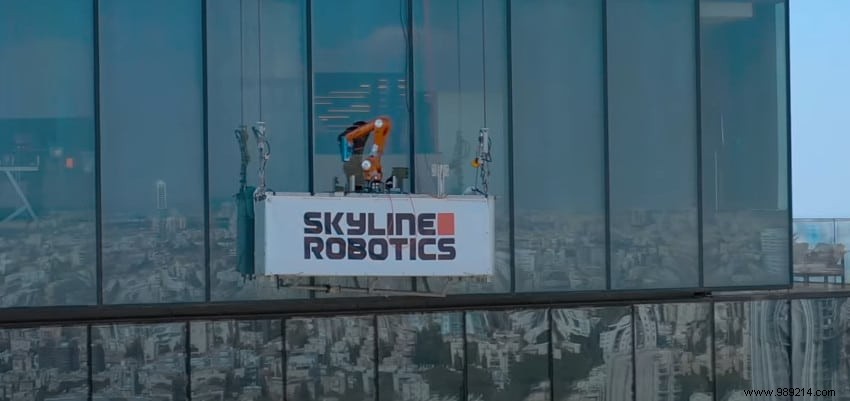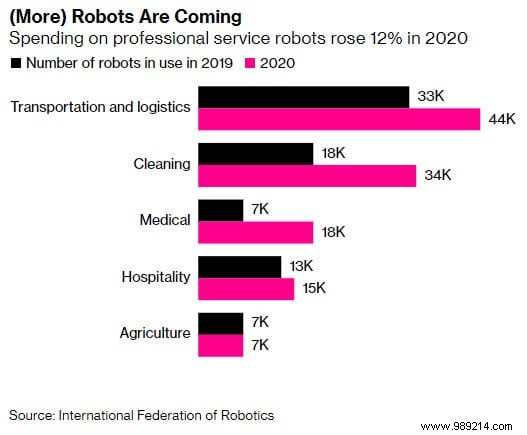Robots are currently so present around us that it is legitimate to ask the question. Thanks to advances in artificial intelligence, autonomous machines can recognize images, text, speech, take orders, inform customers, etc., and can thus take over many tasks usually entrusted to humans. Companies have been integrating machines into their staff for several years. And for good reason:robots are fast, inexhaustible and never complain! And according to a Bloomberg article, the pandemic and subsequent labor shortage are now driving companies to increasingly rely on robots.
A recent Federal Reserve survey found that about one-third of U.S. companies facing recruiting challenges are implementing or exploring automation to replace workers. David Zapico, CEO of robotics company Ametek Inc., which makes automation equipment for industrial companies, confirms that his business is currently running at full speed. “People want to take out work ", did he declare. Executives from Domino's Pizza and Hormel Foods Corp also told Bloomberg that they are investing in automation to reduce labor costs.
Recently, we were talking about the fact that McDonald's partnered with IBM to replace drive-thru workers with artificial intelligence, a strategy that would allow the chain's restaurants to reduce their workforce. The famous Boston Dynamics robot dogs, already very involved in the American army and law enforcement, can also handle certain agricultural tasks, or play the role of sheepdogs. In another register, they make it possible to follow the progress of construction sites and have made it possible to assess the levels of radiation within the former Chernobyl nuclear power plant. What do all these automated tasks have in common? Their painful and/or dangerous nature.
Robotics has also conquered the private sphere:robot vacuum cleaners, robot window cleaners, robot lawn mowers, robot pool cleaners, are just as many gadgets that prevent us from having to do these repetitive, painful tasks. and unhappy. Consequently, one could at first sight welcome the fact that machines take on these tasks instead of human beings, especially when they make it possible to preserve the health and safety of employees. Latest example:the Ozmo robot, developed by Skyline Robotics, designed to polish the windows of New York buildings - thus preventing human beings from taking risks.

The problem is that many of these routine manual tasks are performed by individuals who have been unable to access more "fulfilling" jobs - for lack of opportunities in an ever tighter labor market, or simply for lack of of skills allowing them to aspire to more interesting or "responsible" positions. As a result, if the trend continues, job openings will become even scarcer, "inequalities will increase, and the outlook for many low-educated workers will not be very good warns Daron Acemoglu, an economist at MIT.
“Brain Corp envisions a world where everyone's life will be safer, simpler and more rewarding thanks to robots. These robots will be as common as computers and mobile phones today are the words of Eugene Izhikevich, co-founder and CEO of Brain Corp, a company that specializes in designing robots to perform "boring, dirty or dangerous" tasks (according to the company's website). Equipped with in-house AI, the BrainOS, its autonomous mobile robots (AMR), are able to evolve in contact with the public, avoid obstacles and adapt to the evolution of their environment. More than 16,000 of these robots are currently deployed; they clean floors, deliver goods or scan store shelves to check inventory. To date, they would have accumulated the equivalent of 6.8 million hours of work. And the CEO is excited to now cover "100 billion square feet" with his fleet of robots.

The AMR market had grown by 27% in 2019. While the pandemic put a damper on the sector in the first half of 2020, the use of automated robotics increased considerably from October 2020 to October 2021, in a number of industrial sectors, particularly in hospitals (+2500%) and education (+426%). This massive adoption of automation is said to be due to the combination of three criteria:a changing labor economy, the pressure of the pandemic and the progress made in AI.
In the early 2000s, the deployment of self-service checkouts in French stores, as in the rest of Europe, raised a wave of concern among employees, who immediately felt threatened. Twenty years later, it is clear that these automatic checkouts are very popular with consumers for the time savings they provide; as these facilities are generally reserved for a limited number of items, the cashiers, on the other hand, are fortunately still there. The recent entry of Amazon Go stores (a cashless store concept) on European soil, in the United Kingdom, however, raises new fears:is this profession not ultimately doomed, like so many others? ?
A study by researchers at the Oxford Martin School, published in 2013, estimated that 47% of jobs were at risk of being replaced by robots and artificial intelligence in the United States within 20 years. An OECD survey, carried out in 2016, estimated that "only" one in ten jobs would be threatened by robotization in the most industrialized countries. “But who can predict what will be technically automatable? “, underlines Gregory Verdugo, researcher at the Center for Economics at the Sorbonne, for whom these figures make absolutely no sense.

Today, robots cook pizzas, others take care of frying food in fast food restaurants. The Israeli start-up Tevel is developing flying robots capable of picking fruit directly from trees. More recently, the Canadian start-up Cobionix presented a robot capable of administering a vaccine without a needle.
“Funny thing is that everyone thinks it can't be replaced by a machine, but I think in the long run, we'll all end up doing it says Serge Abiteboul, researcher in the Department of Computer Science at the École Normale Supérieure, when he mentions the fact that a significant part of scientific research is today entrusted to artificial intelligence. Because tasks considered more "cognitive" and less routine are also starting to be gradually replaced by AI:text translation, financial advice, script writing, graphic art, etc.
Almost any task is now automatable and not just so-called repetitive tasks. For economist Gilles Saint-Paul, any task can be broken down into a series of actions to be carried out strictly. “The process is redesigned so that non-routine tasks are replaced by routine tasks that can be automated. […] Once you understand a task well, all of them can become routine he says.
Companies are using automation to increase their productivity. But beware of shortcuts:automation doesn't necessarily kill jobs. According to the spill theory, established by the French economist Alfred Sauvy in the 1980s, technological progress leads to better productivity, which makes it possible to lower the prices of certain products, which causes an increase in consumption, which creates in turn new jobs to make them. “The shift from horse to car put coachmen out of work, but also created an entire automobile industry. […] There is no economic model that guarantees it, but so far technological innovation has never killed jobs said Gregory Verdugo.
For example, a Statistics Canada report dated November 2020, shows that Canadian companies that employ robots have also hired more (15% more) human workers. Not to mention that it will necessarily take a few humans to supervise the work of the robots, if only for questions of ethics and legal or moral responsibilities - even if, in the long term, "we will be closer to a human". for 500 machines", estimates Gilles Saint-Paul.
That said, as the OECD report points out, there is no "communicating vessel" phenomenon between the jobs lost by automation and the jobs that will eventually be created:the skills required to perform both the others are very different! “The trade knowledge accumulated over the years by experienced employees can suddenly no longer be of much interest, as soon as the machine takes over the routine tasks. […] The retraining of personnel penalized by the robotics revolution in new jobs in the digital economy will not be easy ", concludes an information report drawn up on behalf of the Senate delegation for foresight, in 2019. It is important to emphasize that this risk of "deskilling" of people also concerns jobs that are now highly qualified (radiologists, airplane pilots, etc.). The fact is that if automation does not kill jobs, it will only increase inequality again and again.